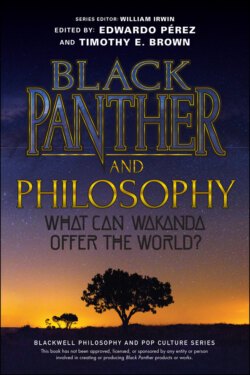Читать книгу Black Panther and Philosophy - Группа авторов - Страница 18
Wakanda Forever?
ОглавлениеOn its surface, Wakanda appears to be a utopia: beautiful, pristine, devoid of poverty, a land where the world’s most educated people care for each other using the world’s most advanced technology. Monarchy isn’t what you’d call a fair system of government, but as monarchies go, Wakanda’s is better than most. A Black Panther is made, not born; anyone can challenge for the right to rule. Monarchy and meritocracy aren’t usually compatible, but somehow Wakanda found a way.
Sort of. In the comics, the trial to become the Black Panther involves more than fighting, but ritual combat has always been the final and most glamorous test in Wakanda. Pacifists need not apply. Also, while strife between the five Wakandan tribes is a long-running theme, solutions for this conflict have never been pretty. The Jabari Tribe is basically Wakanda’s Tibet, cast into the mountainous hinterlands because of its religious beliefs. And the Dora Milaje weren’t originally an elite security unit. Instead, each tribe sent a teenage girl to the Black Panther as a ceremonial wife-in-training, with the idea that any tribe might theoretically wed itself to royalty.1 Hence their name, “the Adored Ones.” Training them to be badasses doesn’t offset the fact that they’re political pawns.
Wakanda is even worse on foreign policy. Of course, a fictional country can do nothing to aid its real-world neighbors, but within the world of the comics, Wakanda has a lot to answer for. It ignored every crisis that scourged central Africa: colonialism, the slave trade, drought, famine, HIV, ethnocide, and the list goes on. So, if T’Challa wants Wakandan justice to be “more civilized,” he’s got a lot of work to do.2
